 Tìm kiếm
Tìm kiếm
Chương 3 Luật nuôi con nuôi 2010: Nuôi con nuôi có yếu tố nước ngoài
| Số hiệu: | 52/2010/QH12 | Loại văn bản: | Luật |
| Nơi ban hành: | Quốc hội | Người ký: | Nguyễn Phú Trọng |
| Ngày ban hành: | 17/06/2010 | Ngày hiệu lực: | 01/01/2011 |
| Ngày công báo: | 23/09/2010 | Số công báo: | Từ số 562 đến số 563 |
| Lĩnh vực: | Quyền dân sự | Tình trạng: | Còn hiệu lực |
TÓM TẮT VĂN BẢN
Văn bản tiếng việt
Văn bản tiếng anh
1. Người Việt Nam định cư ở nước ngoài, người nước ngoài thường trú ở nước cùng là thành viên của điều ước quốc tế về nuôi con nuôi với Việt Nam nhận trẻ em Việt Nam làm con nuôi.
2. Người Việt Nam định cư ở nước ngoài, người nước ngoài thường trú ở nước ngoài được nhận con nuôi đích danh trong các trường hợp sau đây:
a) Là cha dượng, mẹ kế của người được nhận làm con nuôi;
b) Là cô, cậu, dì, chú, bác ruột của người được nhận làm con nuôi;
c) Có con nuôi là anh, chị, em ruột của trẻ em được nhận làm con nuôi;
d) Nhận trẻ em khuyết tật, nhiễm HIV/AIDS hoặc mắc bệnh hiểm nghèo khác làm con nuôi;
đ) Là người nước ngoài đang làm việc, học tập ở Việt Nam trong thời gian ít nhất là 01 năm.
3. Công dân Việt Nam thường trú ở trong nước nhận trẻ em nước ngoài làm con nuôi.
4. Người nước ngoài thường trú ở Việt Nam nhận con nuôi ở Việt Nam.
1. Người Việt Nam định cư ở nước ngoài, người nước ngoài thường trú ở nước ngoài nhận người Việt Nam làm con nuôi phải có đủ các điều kiện theo quy định của pháp luật nước nơi người đó thường trú và quy định tại Điều 14 của Luật này.
2. Công dân Việt Nam nhận người nước ngoài làm con nuôi phải có đủ các điều kiện theo quy định tại điều 14 của Luật này và pháp luật của nước nơi người được nhận làm con nuôi thường trú.
Giấy tờ, tài liệu trong hồ sơ của người nhận con nuôi, hồ sơ của tổ chức con nuôi nước ngoài do cơ quan có thẩm quyền của nước ngoài lập, cấp hoặc xác nhận phải được hợp pháp hóa lãnh sự khi sử dụng ở Việt Nam, trừ trường hợp được miễn hợp pháp hóa lãnh sự theo điều ước quốc tế mà Cộng hòa xã hội chủ nghĩa Việt Nam là thành viên hoặc theo nguyên tắc có đi có lại.
1. Hồ sơ của người Việt Nam định cư ở nước ngoài, người nước ngoài thường trú ở nước ngoài nhận người Việt Nam làm con nuôi phải có các giấy tờ, tài liệu sau đây:
a) Đơn xin nhận con nuôi;
b) Bản sao Hộ chiếu hoặc giấy tờ có giá trị thay thế;
c) Văn bản cho phép được nhận con nuôi ở Việt Nam;
d) Bản điều tra về tâm lý, gia đình;
đ) Văn bản xác nhận tình trạng sức khỏe;
e) Văn bản xác nhận thu nhập và tài sản;
h) Văn bản xác nhận tình trạng hôn nhân;
i) Tài liệu chứng minh thuộc trường hợp được xin đích danh quy định tại khoản 2 Điều 28 của Luật này.
2. Các giấy tờ, tài liệu quy định tại điểm b, c, d, đ, e, g và h khoản 1 điều này do cơ quan có thẩm quyền của nước nơi người nhận con nuôi thường trú lập, cấp hoặc xác nhận.
3. Hồ sơ của người nhận con nuôi được lập thành 02 bộ và nộp cho Bộ Tư pháp thông qua cơ quan trung ương về nuôi con nuôi của nước nơi người nhận con nuôi thường trú; trường hợp nhận con nuôi đích danh quy định tại khoản 2 Điều 28 của Luật này thì người nhận con nuôi có thể trực tiếp nộp hồ sơ cho Bộ Tư pháp.
1. Hồ sơ của người được giới thiệu làm con nuôi nước ngoài gồm có:
a) Các giấy tờ, tài liệu quy định tại khoản 1 Điều 18 của Luật này;
b) Văn bản về đặc điểm, sở thích, thói quen đáng lưu ý của trẻ em;
c) Tài liệu chứng minh đã thực hiện việc tìm gia đình thay thế trong nước cho trẻ em theo quy định tại khoản 2 điều 15 của Luật này nhưng không thành.
2. Hồ sơ quy định tại khoản 1 điều này được lập thành 03 bộ và nộp cho Sở Tư pháp nơi người được giới thiệu làm con nuôi thường trú.
3. Cha mẹ đẻ hoặc người giám hộ lập hồ sơ của người được giới thiệu làm con nuôi sống tại gia đình; cơ sở nuôi dưỡng lập hồ sơ của trẻ em được giới thiệu làm con nuôi sống tại cơ sở nuôi dưỡng.
1. Sở Tư pháp có trách nhiệm kiểm tra hồ sơ, tiến hành lấy ý kiến của những người quy định tại điều 21 của Luật này trong thời hạn 20 ngày, kể từ ngày nhận đủ hồ sơ hợp lệ. Việc lấy ý kiến phải lập thành văn bản và có chữ ký hoặc điểm chỉ của người được lấy ý kiến.
Trường hợp trẻ em bị bỏ rơi cần được xác minh thì Sở Tư pháp đề nghị Công an tỉnh, thành phố trực thuộc trung ương xác minh; cơ quan công an có trách nhiệm xác minh và trả lời bằng văn bản trong thời hạn 30 ngày, kể từ ngày nhận được đề nghị của Sở Tư pháp.
2. Sau khi kiểm tra, xác minh theo quy định tại khoản 1 điều này, nếu thấy trẻ em có đủ điều kiện để cho làm con nuôi nước ngoài thì Sở Tư pháp xác nhận và gửi Bộ Tư pháp.
1. Bộ Tư pháp có trách nhiệm kiểm tra và xử lý hồ sơ của người nhận con nuôi theo quy định tại khoản 2 hoặc khoản 3 điều này trong thời hạn 15 ngày, kể từ ngày nhận đủ hồ sơ hợp lệ.
2. Trường hợp người nhận con nuôi đích danh quy định tại khoản 2 Điều 28 của Luật này, Bộ Tư pháp chuyển hồ sơ cho Sở Tư pháp nơi người được giới thiệu làm con nuôi thường trú để trình Ủy ban nhân dân cấp tỉnh xem xét, quyết định.
3. Sau khi kết thúc thời hạn thông báo tìm gia đình thay thế cho trẻ em theo quy định tại khoản 2 Điều 15 của Luật này, nếu trẻ em không được người trong nước nhận làm con nuôi thì Bộ Tư pháp chuyển hồ sơ của người nhận con nuôi cho Sở Tư pháp nơi trẻ em được giới thiệu làm con nuôi thường trú để xem xét, giới thiệu trẻ em làm con nuôi theo trình tự quy định tại Điều 36 của Luật này, trừ trường hợp quy định tại khoản 2 điều này.
Việc giới thiệu trẻ em làm con nuôi người nước ngoài được thực hiện vì lợi ích của trẻ em, có tính đến lợi ích của người nhận con nuôi trên cơ sở bảo đảm những yêu cầu cơ bản sau đây:
1. Đặc điểm, sở thích, thói quen đáng lưu ý của trẻ em;
2. Khả năng hòa nhập và phát triển của trẻ em;
3. Điều kiện kinh tế, môi trường gia đình, xã hội và nguyện vọng của người nhận con nuôi.
1. Trong thời hạn 30 ngày, kể từ ngày nhận được hồ sơ của người nhận con nuôi, Sở Tư pháp xem xét, giới thiệu trẻ em làm con nuôi trên cơ sở bảo đảm các căn cứ quy định tại Điều 35 của Luật này và báo cáo Ủy ban nhân dân cấp tỉnh. Trong thời hạn 10 ngày, kể từ ngày nhận được hồ sơ do Sở Tư pháp trình, nếu Ủy ban nhân dân cấp tỉnh đồng ý thì thông báo cho Sở Tư pháp để làm thủ tục chuyển hồ sơ cho Bộ Tư pháp; trường hợp không đồng ý thì trả lời bằng văn bản và nêu rõ lý do.
Trước khi Sở Tư pháp xem xét, giới thiệu trẻ em làm con nuôi nước ngoài, nếu có người trong nước nhận trẻ em làm con nuôi thì người đó liên hệ với Ủy ban nhân dân cấp xã nơi trẻ em thường trú để xem xét, giải quyết; nếu việc nhận con nuôi đã hoàn thành thì Ủy ban nhân dân cấp xã báo cáo Sở Tư pháp để chấm dứt việc giới thiệu trẻ em làm con nuôi nước ngoài.
2. Trong thời hạn 30 ngày, kể từ ngày nhận được báo cáo kết quả giới thiệu trẻ em làm con nuôi, Bộ Tư pháp kiểm tra việc giới thiệu trẻ em làm con nuôi, nếu hợp lệ thì lập bản đánh giá việc trẻ em Việt Nam đủ điều kiện được làm con nuôi nước ngoài và thông báo cho cơ quan có thẩm quyền của nước nơi người nhận con nuôi thường trú.
3. Trong thời hạn 15 ngày, kể từ ngày nhận được văn bản của cơ quan có thẩm quyền của nước nơi người nhận con nuôi thường trú thông báo về sự đồng ý của người nhận con nuôi đối với trẻ em được giới thiệu, xác nhận trẻ em sẽ được nhập cảnh và thường trú tại nước mà trẻ em được nhận làm con nuôi, Bộ Tư pháp thông báo cho Sở Tư pháp.
Người nhận con nuôi không được có bất kỳ sự tiếp xúc nào với cha mẹ, người giám hộ hoặc cơ sở nuôi dưỡng trẻ em trước khi nhận được thông báo giới thiệu trẻ em làm con nuôi, trừ trường hợp quy định tại khoản 2 Điều 28 của Luật này.
4. Trường hợp người nhận con nuôi từ chối nhận trẻ em được giới thiệu làm con nuôi mà không có lý do chính đáng thì việc giải quyết hồ sơ xin nhận con nuôi của người đó chấm dứt.
1. Sau khi nhận được thông báo của Bộ Tư pháp quy định tại khoản 3 Điều 36 của Luật này, Sở Tư pháp trình Ủy ban nhân dân cấp tỉnh quyết định cho trẻ em làm con nuôi nước ngoài.
Trong thời hạn 15 ngày, kể từ ngày nhận được hồ sơ do Sở Tư pháp trình, Ủy ban nhân dân cấp tỉnh quyết định cho trẻ em làm con nuôi nước ngoài.
2. Ngay sau khi có quyết định cho trẻ em làm con nuôi nước ngoài của Ủy ban nhân dân cấp tỉnh, Sở Tư pháp thông báo cho người nhận con nuôi đến Việt Nam để nhận con nuôi. Người nhận con nuôi phải có mặt ở Việt Nam để trực tiếp nhận con nuôi trong thời hạn 60 ngày, kể từ ngày nhận được thông báo của Sở Tư pháp; trường hợp vợ chồng xin nhận con nuôi mà một trong hai người vì lý do khách quan không thể có mặt tại lễ giao nhận con nuôi thì phải có ủy quyền cho người kia; trường hợp có lý do chính đáng thì thời hạn trên có thể kéo dài, nhưng không quá 90 ngày. Hết thời hạn nêu trên, nếu người nhận con nuôi không đến nhận con nuôi thì Ủy ban nhân dân cấp tỉnh hủy quyết định cho trẻ em làm con nuôi nước ngoài.
3. Sở Tư pháp đăng ký việc nuôi con nuôi theo quy định của pháp luật về đăng ký hộ tịch và tổ chức lễ giao nhận con nuôi tại trụ sở Sở Tư pháp, với sự có mặt của đại diện Sở Tư pháp, trẻ em được nhận làm con nuôi, cha mẹ nuôi, đại diện cơ sở nuôi dưỡng đối với trẻ em được xin nhận làm con nuôi từ cơ sở nuôi dưỡng hoặc cha mẹ đẻ, người giám hộ của trẻ em đối với trẻ em được xin nhận làm con nuôi từ gia đình.
Việc giao nhận con nuôi phải được lập thành biên bản, có chữ ký hoặc điểm chỉ của các bên và đại diện Sở Tư pháp.
4. Sau khi giao nhận con nuôi, Sở Tư pháp có trách nhiệm gửi Bộ Tư pháp quyết định cho trẻ em là con nuôi nước ngoài của Ủy ban nhân dân cấp tỉnh, biên bản giao nhận con nuôi, đồng thời gửi Ủy ban nhân dân cấp xã nơi thường trú của trẻ em được cho làm con nuôi nước ngoài.
5. Bộ Tư pháp gửi quyết định cho trẻ em làm con nuôi nước ngoài cho Bộ Ngoại giao để thông báo cho Cơ quan đại diện của Việt Nam ở nước ngoài về việc trẻ em được nhận làm con nuôi để thực hiện biện pháp bảo hộ trẻ em trong trường hợp cần thiết.
Bộ Tư pháp chứng nhận việc nuôi con nuôi đã được giải quyết theo đúng quy định của Luật này và điều ước quốc tế về nuôi con nuôi mà Cộng hòa xã hội chủ nghĩa Việt Nam là thành viên để gửi cơ quan, tổ chức có thẩm quyền của nước ngoài, nếu có yêu cầu.
Sáu tháng một lần trong thời hạn 03 năm, kể từ ngày giao nhận con nuôi, cha mẹ nuôi có trách nhiệm thông báo cho Bộ Tư pháp và Cơ quan đại diện của Việt Nam ở nước nơi con nuôi thường trú về tình trạng sức khỏe, thể chất, tinh thần, sự hòa nhập của con nuôi với cha mẹ nuôi, gia đình, cộng đồng.
1. Công dân Việt Nam nhận trẻ em nước ngoài làm con nuôi phải lập hồ sơ theo quy định tại Điều 17 của Luật này gửi Bộ Tư pháp. Bộ Tư pháp xem xét, cấp giấy xác nhận người nhận con nuôi có đủ điều kiện nuôi con nuôi theo quy định của pháp luật Việt Nam trong thời hạn 30 ngày, kể từ ngày nhận đủ hồ sơ hợp lệ. Trường hợp cần thiết, Bộ Tư pháp yêu cầu Sở Tư pháp nơi người đó thường trú xác minh thì thời hạn có thể kéo dài, nhưng không quá 60 ngày.
2. Sau khi hoàn tất các thủ tục nhận trẻ em nước ngoài làm con nuôi, công dân Việt Nam có trách nhiệm làm thủ tục ghi chú việc nuôi con nuôi tại Sở Tư pháp và Ủy ban nhân dân cấp xã nơi người đó thường trú.
1. Quy định tại các Điều 14, 15, 16, 17, 18, 21, 23, 24, 25, 26 và 27 của Luật này được áp dụng đối với người nước ngoài thường trú ở Việt Nam nhận con nuôi ở Việt Nam.
2. Hồ sơ của người nhận con nuôi và người được giới thiệu làm con nuôi được nộp cho Sở Tư pháp nơi người được giới thiệu làm con nuôi thường trú. Sở Tư pháp có trách nhiệm kiểm tra hồ sơ, lấy ý kiến của những người quy định tại Điều 21 của Luật này.
Khi xét thấy người nhận con nuôi và người được giới thiệu làm con nuôi có đủ điều kiện theo quy định của Luật này thì Sở Tư pháp trình Ủy ban nhân dân cấp tỉnh xem xét, quyết định.
3. Trong thời hạn 15 ngày, kể từ ngày nhận được hồ sơ do Sở Tư pháp trình, Ủy ban nhân dân cấp tỉnh quyết định cho người nước ngoài thường trú ở Việt Nam nhận con nuôi; trường hợp từ chối thì phải trả lời cho người nhận con nuôi bằng văn bản và nêu rõ lý do.
4. Ngay sau khi có quyết định của Ủy ban nhân dân cấp tỉnh, Sở Tư pháp đăng ký việc nuôi con nuôi theo quy định của pháp luật về đăng ký hộ tịch, tổ chức lễ giao nhận con nuôi tại trụ sở Sở Tư pháp với sự có mặt của đại diện Sở Tư pháp, người được nhận làm con nuôi, cha mẹ nuôi, đại diện cơ sở nuôi dưỡng đối với trẻ em được xin nhận làm con nuôi từ cơ sở nuôi dưỡng hoặc cha mẹ đẻ, người giám hộ đối với người được xin nhận làm con nuôi từ gia đình và gửi quyết định cho Ủy ban nhân dân cấp xã nơi thường trú của người nhận con nuôi. Trường hợp người nhận con nuôi không đến nhận con nuôi mà không có lý do chính đáng thì Ủy ban nhân dân cấp tỉnh hủy quyết định cho người nước ngoài thường trú ở Việt Nam nhận con nuôi.
Việc giao nhận con nuôi phải được lập thành biên bản, có chữ ký hoặc điểm chỉ của các bên và đại diện Sở Tư pháp.
Căn cứ vào các quy định của Luật này và tình hình thực tế, Chính phủ quy định thủ tục giải quyết nuôi con nuôi giữa công dân Việt Nam với công dân của nước láng giềng thường trú ở khu vực biên giới.
1. Tổ chức con nuôi nước ngoài được cấp giấy phép hoạt động tại Việt Nam khi có đủ các điều kiện sau đây:
a) Được thành lập và hoạt động hợp pháp, phi lợi nhuận trong lĩnh vực nuôi con nuôi trên lãnh thổ của nước là thành viên của điều ước quốc tế về nuôi con nuôi mà Việt Nam là thành viên;
b) Được cơ quan có thẩm quyền về nuôi con nuôi của nước nơi thành lập cho phép hoạt động trong lĩnh vực nuôi con nuôi tại Việt Nam;
c) Có thời gian hoạt động trong lĩnh vực con nuôi quốc tế liên tục từ 03 năm trở lên, không vi phạm pháp luật và được cơ quan có thẩm quyền của nước đó xác nhận;
d) Có đội ngũ nhân viên công tác xã hội và pháp lý hiểu biết về pháp luật, văn hóa, xã hội của Việt Nam và pháp luật quốc tế về nuôi con nuôi;
đ) Người đại diện của tổ chức tại Việt Nam có đủ tiêu chuẩn về đạo đức, chuyên môn về lĩnh vực nuôi con nuôi.
2. Tổ chức con nuôi nước ngoài hoạt động tại Việt Nam có các quyền, nghĩa vụ sau đây:
a) Tư vấn cho người nhận con nuôi về điều kiện kinh tế - xã hội, hoàn cảnh gia đình, môi trường xã hội, nhu cầu và sở thích của trẻ em Việt Nam;
b) Thay mặt người nhận con nuôi thực hiện các thủ tục giải quyết việc nuôi con nuôi ở Việt Nam;
c) Hỗ trợ tìm gia đình thay thế cho trẻ em khuyết tật, nhiễm HIV/AIDS hoặc mắc bệnh hiểm nghèo khác;
d) Được cung cấp thông tin, pháp luật và tham gia các khóa bồi dưỡng về nuôi con nuôi do cơ quan có thẩm quyền của Việt Nam tiến hành;
đ) Thuê trụ sở, sử dụng lao động Việt Nam làm việc theo quy định của pháp luật;
e) Chấp hành pháp luật, tôn trọng phong tục, tập quán của Việt Nam;
g) Định kỳ hằng năm báo cáo về tình hình phát triển của trẻ em Việt Nam được nhận làm con nuôi gửi Bộ Tư pháp;
h) Hỗ trợ cha mẹ nuôi trong việc giữ gìn bản sắc văn hóa Việt Nam cho trẻ em được nhận làm con nuôi;
i) Nộp lệ phí cấp, gia hạn, sửa đổi giấy phép hoạt động tại Việt Nam;
k) Báo cáo tình hình hoạt động, chịu sự kiểm tra, thanh tra của các cơ quan có thẩm quyền của Việt Nam theo quy định của pháp luật.
3. Tổ chức con nuôi nước ngoài bị thu hồi giấy phép hoạt động tại Việt Nam trong các trường hợp sau đây:
a) Không còn đủ điều kiện quy định tại khoản 1 điều này;
b) Vi phạm nghĩa vụ quy định tại điểm e khoản 2 điều này.
4. Chính phủ quy định chi tiết mức thu, việc quản lý, sử dụng lệ phí và thủ tục cấp, gia hạn, sửa đổi, thu hồi giấy phép hoạt động của tổ chức con nuôi nước ngoài tại Việt Nam.
Article 28. Cases of intercountry adoption
1. Overseas Vietnamese, foreigners permanently residing in the countries being contracting parties to an adoption treaty along with Vietnam adopt a Vietnamese child.
2. Overseas Vietnamese, foreigners permanently residing abroad may adopt a specific child in the following cases:
a/ He/she is the step father or step mother of the to-be-adopted child;
b/ He/she is the natural aunt or uncle of the to-be-adopted child;
c/ He/she has adopted a child who is a sibling of the to-be-adopted child;
d/ He/she adopts a child who is disabled or infected with HIV/AIDS or another dangerous disease;
e/ He/she is a foreigner currently working or studying in Vietnam for at least 1 year;
3. Vietnamese citizens permanently residing in the country adopt a foreign child.
4. Foreigners permanently residing in Vietnam adopt a child in Vietnam.
Article 29. Conditions on adopting persons
1. Overseas Vietnamese or foreigners permanently residing abroad who seek to adopt a Vietnamese must meet all conditions required by the law of the country in which they permanently reside and specified in Article 14 of this Law.
2. Vietnamese citizens who seek to adopt a foreigner must meet all conditions specified in Article 14 of this Law and required by the law of the country in which the to-be-adopted person permanently resides.
Article 30. Consular legalization of papers and documents
Papers and documents in the dossier of the adopting person and the dossier of the foreign adoption organization compiled, granted or certified by a competent foreign agency must be consularly legalized for use in Vietnam, unless they are exempt from consular legalization under a treaty to which the Socialist Republic of Vietnam is a contracting party or on the reciprocity principle.
Article 31. Dossiers of adopting persons
1. A dossier of an overseas Vietnamese or a foreigner permanently residing abroad seeking to adopt a Vietnamese must comprise:
a/ A written request for adoption;
b/ A copy of the passport or a valid substitute paper;
c/ A written permission for adopting a person in Vietnam:
d/ A completed questionnaire on psychology and family;
e/ A health certificate;
f/ An income and property certificate;
g/ A judicial record sheet:
h/ A written certification of the marital status;
i/ Adocument evidencing the case of adoption of a specific child specified in Clause 2, Article 28 of this Law.
2. Papers and documents stated at Points b thru h. Clause 1 of this Article must be made, issued or certified by competent agencies of the country in which the adopting person permanently resides.
3. A dossier of the adopting person shall be made in 2 sets and submitted to the Ministry of Justice via the central adoption agency of the country in which the adopting person permanently resides; in case of adopting a specific person stated in Clause 2. Article 28 of this Law. the adopting person may submit the dossier directly to the Ministry of Justice.
Article 32. Dossiers of persons introduced for adoption by foreigners
1. A dossier of a person introduced for intercountry adoption comprises:
a/ Papers and documents specified in Clause 1. Article 18 of this Law;
b/ Document on the remarkable characteristics, hobbies and habits of the child:
c/ A document evidencing the failure of finding a domestic substitute family under Clause
2. Article 15 of this Law.
2. A dossier stated in Clause 1 of this Article shall be made in 3 sets and submitted to the provincial-level Justice Department of the place in which the person introduced for adoption permanently resides.
3. The natural parents or guardian shall compile a dossier for the person introduced for adoption who lives with his/her family: the nurturing center shall compile a dossier for the child introduced for adoption who lives in the nurturing center.
Article 33. Responsibility for examining and verifying dossiers and certifying children's eligibility for being adopted
1. Within 20 days after receiving a complete and valid dossier, the provincial-level Justice Department shall examine the dossier and consult persons specified in Article 21 of this Law. The consultation must be expressed in documents bearing the signatures or fingerprints of the consulted persons.
For an abandoned child who needs to be verified, the provincial-level Justice Department may request the provincial-level Police Department to verify; the requested Police Department shall conduct verification and issue a written reply within 30 days after receiving the request of the provincial-level Justice Department.
2. After completing the examination and verification under Clause 1 of this Article, if seeing that the child is eligible for intercountry adoption, the provincial-level Justice Department shall issue a certificate to this effect and send it to the Ministry of Justice.
Article 34. Responsibility for examining and transferring dossiers of adopting persons
1. Within 15 days after receiving a complete and valid dossier, the Ministry of Justice shall examine and process the dossier of an adopting person under Clause 2 or 3 of this Article.
2. In case the adopting person seeks to adopt a specific child under Clause 2. Article 28 of this Law, the Ministry of Justice shall transfer the dossier to the provincial-level Justice Department of the place in which the person introduced for adoption permanently resides for submission to the provincial-level People's Committee for consideration and decision.
3. After the time limit of announcement to find a substitute family for a child specified in Clause 2. Article 15 of this Law, if nobody in the country can be found, the Ministry of Justice shall send the dossier of the adopting person to the provincial-level Justice Department of the place in which the child introduced for adoption permanently resides for consideration and introduction for adoption in the order specified in Article 36 of this Law. except the case specified in Clause 2 of this Article.
Article 35. Grounds for introduction of children for adoption
The introduction of a child for intercountry adoption must be in the interests of the child, taking into account the interests of the adopting person on the basis of ensuring the following basic requirements:
1. The child's remarkable characteristics, hobbies and habits:
2. The child's integration and development ability;
3. The adopting person's financial conditions, family and social environments and aspirations.
Article 36. Sequence of introduction of children for adoption
1. Within 30 days after receiving the dossier of the adopting person, the provincial-level Justice Department shall consider and introduce a child for adoption on the basis of ensuring the grounds provided in Article 35 of this Law and report it to the provincial-level People's Committee. Within 10 days after receiving the dossier from the provincial-level Justice Department, if approving the dossier, the provincial-level People's Committee shall notify it to the provincial-level Justice Department for carrying out procedures for forwarding the dossier to the Ministry of Justice; if disapproving the dossier, it shall issue a written reply clearly stating the reason.
Before the provincial-level Justice Department considers and introduces a child for intercountry adoption, if a person seeks to adopt the child, he/she shall contact the commune-level People's Committee of the place in which the child permanently resides for consideration and settlement; once the adoption completes, the commune-level People's Committee shall report it to the provincial-level Justice Department for terminating the introduction of the child for intercountry adoption.
2. Within 30 days after receiving a report on the result of the introduction of a child for adoption, the Ministry of Justice shall examine such introduction; if it is valid, it shall make an assessment report on the Vietnamese child's eligibility for intercountry adoption and notify the competent agency of the country in which the adopting person permanently resides.
3. Within 15 days after receiving a document of the competent agency ofthe country in which the adopting person permanently resides notifying the consent of the adopting person to the introduced child and certifying that the child will be allowed to enter and permanently reside in the country in which child is adopted, the Ministry of Justice shall notify it to the provincial-level Justice Department.
The adopting person may not come into contact with the parents or guardian or nurturing center before receiving the notification of the introduction of the child for adoption, except for the case specified in Clause 2. Article 28 of this Law.
4. If the adopting person refuses to adopt the child introduced for adoption without a plausible reason, the settlement of his/her adoption request dossier will terminate.
Article 37. Decision to allow children to be adopted by foreigners and organization of the delivery and receipt of adopted children
1. After receiving a notice of the Ministry of Justice under Clause 3. Article 36 of this Law, the provincial-level Justice Department shall submit the case's dossier to the provincial-level People's Committee for decision to allow the child's intercountry adoption.
Within 15 days after receiving the dossier from the provincial-level Justice Department, the provincial-level People's Committee shall decide to allow the child's intercountry adoption.
2. Immediately after receiving the provincial- level People's Committee's decision to allow the child's intercountry adoption, the provincial-level Justice Department shall notify the adopting person to come to Vietnam for receiving the child. Within 60 days after receiving the notice of the provincial-level Justice Department, the adopting person must be present in Vietnam; in case both husband and wife seek to adopt a child but either of them cannot not be present at the child delivery and receipt ceremony for an objective reason, he/she must make an authorization to the other; this time limit may be extended for a plausible reason but must not exceed 90 days. Past this time limit, if the adopting person fails to come to receive the child, the provincial-level People's Committee shall cancel the decision to allow the child's intercountry adoption.
3. The provincial-level Justice Department shall register the adoption under the law on civil status registration and organize a child delivery and receipt ceremony at its head office in the presence of a representative of the provincial- level Justice Department, the adopted child, the adoptive parents, a representative of the nurturing center, for children living in nurturing centers, or the natural parents or the guardian of the child, for children living with their families.
The delivery and receipt of an adopted child must be recorded in a minutes bearing the signatures or fingerprints of the involved parties and the representative of the provincial-level Justice Department.
4. Following the deliver)' and receipt of an adopted child, the provincial-level Justice Department shall send the provincial-level People's Committee's decision to allow the child's adoption by a foreigner and the minutes of the child's delivery and receipt to the Ministry of Justice and the commune-level People's Committee of the place in which the adopted child permanently resides.
5. The Ministry of Justice shall send the decision to allow a child's intercountry adoption to the Ministry of Foreign Affairs for notification to the overseas Vietnamese representative mission of the adoption for taking child protection measures when necessary.
Article 38. Certification of adoption
The Ministry of Justice shall issue a certificate that an adoption has been settled under this Law and an adoption treaty to which the Socialist Republic of Vietnam is a contracting party for sending to competent foreign authorities upon request.
Article 39. Notification of the growth of adopted children
Once every six months within 3 years from the date of delivery and receipt of an adopted child, the adoptive parents shall notify the Vietnamese Ministry of Justice and representative mission in the country in which the adopted child permanently resides of the child's health and physical and mental conditions and integration with the adoptive parents and their family and community.
Article 40. Adoption of foreign children by Vietnamese citizens living in the country
1. A Vietnamese citizen seeking to adopt a foreign child shall compile a dossier under Article 17 of this Law and send it to the Ministry of Justice. The Ministry of Justice shall consider and issue a certificate of the adopting person's eligibility under Vietnamese law within 30 days after receiving a complete and valid dossier. When necessary, the Ministry of Justice may request verification by the provincial-level Justice Department of the place in which such person permanently resides; in this case this time limit may be extended but must not exceed 60 days.
2. After completing all procedures for adopting a foreign child, the Vietnamese citizen shall carry out the recording procedure at the provincial-level Justice Department and the commune-level of the place in which he/she permanently resides.
Article 41. Adoption by foreigners permanently residing in Vietnam
1. Articles 14. 15. 16, 17, 18. 21, 23, 24. 25, 26 and 27 of this Law are applicable to foreigners permanently residing in Vietnam and seeking to adopt a child in Vietnam.
2. The dossiers of the adopting person and person introduced for adoption shall be submitted to the provincial-level Justice Department of (he place in which the person introduced for adoption permanently resides. The provincial-level Justice Department shall examine the dossiers and consult persons referred to in Article 21 of this Law.
If seeing that the adopting person and person introduced for adoption are eligible under this Law, the provincial-level Justice Department shall submit their dossiers to the provincial-level People's Committee for consideration and decision.
3. Within 15 days after receiving the dossiers from the provincial-level Justice Department, the provincial-level People's Committee shall decide to allow the foreigner permanently residing in Vietnam to adopt the child; in case of refusal, it shall reply in writing clearly stating the reason to the adopting person.
4. Immediately after receiving the provincial-level People's Committee's decision, the provincial-level Justice Department shall register the adoption under the law on civil status registration and organize a child delivery and receipt ceremony at its head office in the presence of a representative of the provincial-level Justice Department, the adopted child, the adoptive parents, a representative of the nurturing center, for children living in nurturing centers, or the natural parents or the guardian of the child, for children living with their families. If the adopting person fails to come to receive the child without a plausible reason, the provincial-level People's Committee shall cancel the decision to allow the foreigner's adoption.
The delivery and receipt of an adopted child must be recorded in a minutes bearing the signatures or fingerprints of the involved parties and the representative of the provincial-level Justice Department.
Article 42. Adoption in border areas
Pursuant to this Law and the practical situation, the Government shall stipulate procedures for settling adoptions between Vietnamese citizens and citizens of neighboring countries permanently residing in border areas.
Article 43. Foreign adoption organizations in Vietnam
1. A foreign adoption organization shall be granted a license to operate in Vietnam when fully meeting the following conditions:
a/ It is lawfully established and operates not for profits in the adoption domain in the territory of the country having acceded to an adoption treaty to which Vietnam is a contracting party;
b/ It is permitted by a competent adoption agency in the country in which it is established to operate in the adoption domain in Vietnam;
c/ It has operated in the intercountry adoption for 3 or more consecutive years without committing any violations as certified by a competent agency of the host country;
d/ It has a staff of social and legal workers knowledgeable about Vietnam's laws, culture and society and international law on adoption:
e/ It has a representative possessing goods ethical qualities and adoption expertise.
2. A foreign adoption organization operating in Vietnam has the following rights and obligations:
a/ To give counseling to adopting persons on socio-economic conditions. family circumstances, social environment, needs and hobbies of Vietnamese children;
b/ To carry out on behalf of the adopting persons procedures for settling adoptions in Vietnam;
c/ To assist in finding substitute families for children who are disabled or infected with HIV/ AIDS or other dangerous diseases;
d/ To be provided with information and legal knowledge and participate in adoption training courses organized by competent Vietnamese agencies;
e/ To rent offices and employ Vietnamese under law;
f/ To observe the laws and respect customs and practices of Vietnam;
g/ To annually report on the growth of adopted Vietnamese children to the Ministry of Justice:
h/ To assist adoptive parents in preserving Vietnamese cultural traits in their adopted children;
i/ To pay fees for (he grant, extension and modification of their licenses to operate in Vietnam;
j/ To report on their operation and submit to the examination and inspection by competent Vietnamese agencies under law.
3. A foreign adoption organization will have its license to operate in Vietnam revoked in the following cases:
a/ No longer meeting all the conditions stated in Clause 1 of this Article;
b/ Breaching its obligation stated at Point f, Clause 2 of this Article.
4. The Government shall specify the rates of the fee for, and the management and use of this fee, and procedures for granting, extending, modifying and revoking operation licenses of Vietnam-based foreign adoption organizations.
Văn bản liên quan
Cập nhật
Điều 7. Khuyến khích hỗ trợ nhân đạo cho việc chăm sóc trẻ em có hoàn cảnh đặc biệt
Điều 9. Thẩm quyền đăng ký nuôi con nuôi
Điều 15. Trách nhiệm tìm gia đình thay thế cho trẻ em
Điều 22. Đăng ký việc nuôi con nuôi
Điều 28. Các trường hợp nuôi con nuôi có yếu tố nước ngoài
Điều 31. Hồ sơ của người nhận con nuôi
Điều 32. Hồ sơ của người được giới thiệu làm con nuôi nước ngoài
Điều 36. Trình tự giới thiệu trẻ em làm con nuôi
Điều 40. Công dân Việt Nam ở trong nước nhận trẻ em nước ngoài làm con nuôi
Điều 7. Khuyến khích hỗ trợ nhân đạo cho việc chăm sóc trẻ em có hoàn cảnh đặc biệt
Điều 9. Thẩm quyền đăng ký nuôi con nuôi
Điều 12. Lệ phí đăng ký nuôi con nuôi, chi phí giải quyết nuôi con nuôi nước ngoài
Điều 15. Trách nhiệm tìm gia đình thay thế cho trẻ em
Điều 17. Hồ sơ của người nhận con nuôi
Điều 20. Kiểm tra hồ sơ, lấy ý kiến của những người liên quan
Điều 21. Sự đồng ý cho làm con nuôi
Điều 22. Đăng ký việc nuôi con nuôi
Điều 28. Các trường hợp nuôi con nuôi có yếu tố nước ngoài
Điều 30. Hợp pháp hóa lãnh sự giấy tờ, tài liệu
Điều 31. Hồ sơ của người nhận con nuôi
Điều 32. Hồ sơ của người được giới thiệu làm con nuôi nước ngoài
Điều 34. Trách nhiệm kiểm tra và chuyển hồ sơ của người nhận con nuôi
Điều 35. Căn cứ để giới thiệu trẻ em làm con nuôi
Điều 36. Trình tự giới thiệu trẻ em làm con nuôi
Điều 40. Công dân Việt Nam ở trong nước nhận trẻ em nước ngoài làm con nuôi
Điều 42. Nuôi con nuôi ở khu vực biên giới
Bài viết liên quan
Nhận nuôi trẻ mồ côi có mất tiền không mới nhất 2025?
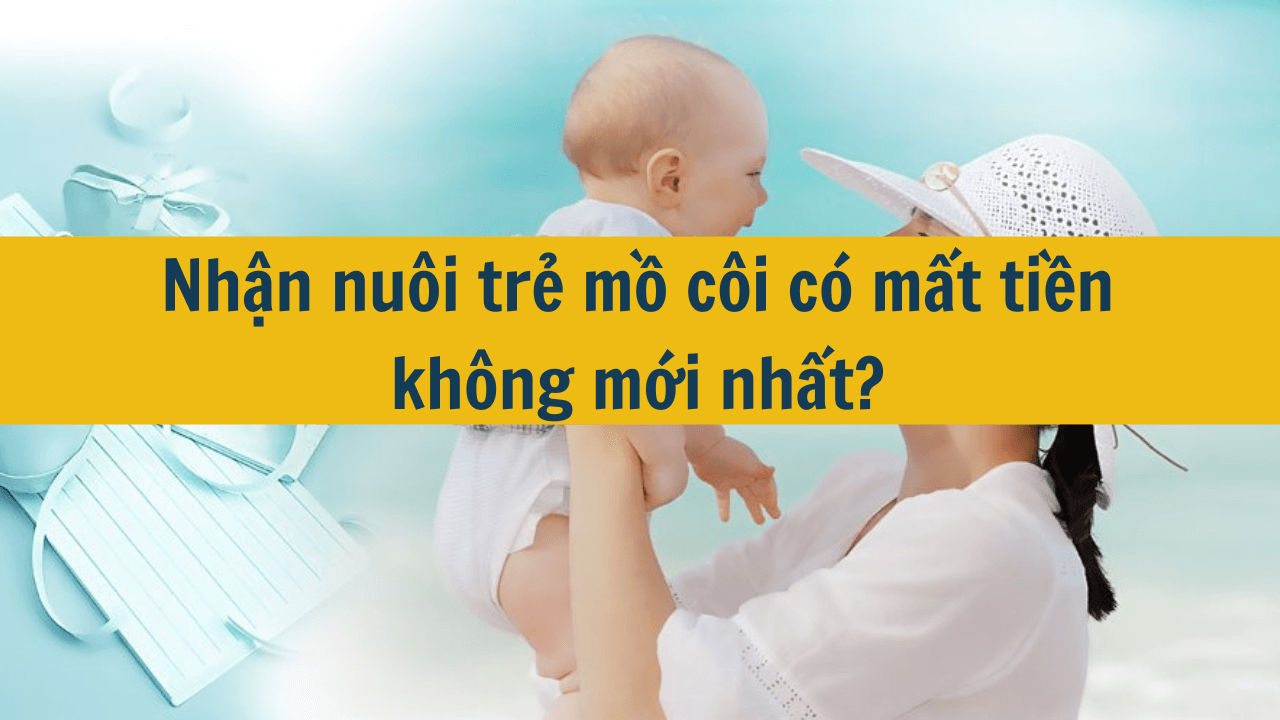
Nhận nuôi trẻ mồ côi có mất tiền không mới nhất 2025?
Việc nhận nuôi trẻ mồ côi là một hành động nhân văn, mang lại cơ hội cho trẻ em không nơi nương tựa được sống trong môi trường gia đình yêu thương và chăm sóc. Tuy nhiên, nhiều người vẫn thắc mắc về các chi phí liên quan đến thủ tục nhận nuôi, liệu có phải trả tiền khi nhận nuôi một trẻ em mồ côi hay không. Theo quy định mới nhất năm 2025, việc nhận nuôi trẻ mồ côi không yêu cầu phải trả một khoản tiền nào cho quá trình này, nhưng vẫn có những chi phí phát sinh trong quá trình làm thủ tục pháp lý. Bài viết dưới đây sẽ cung cấp thông tin chi tiết về các khoản chi phí và các quy định liên quan đến việc nhận nuôi trẻ mồ côi trong năm 2025. 28/12/2024Thời hạn giải quyết hồ sơ nhận nuôi con nuôi ở trại trẻ mô côi bao nhiêu lâu mới nhất 2025?
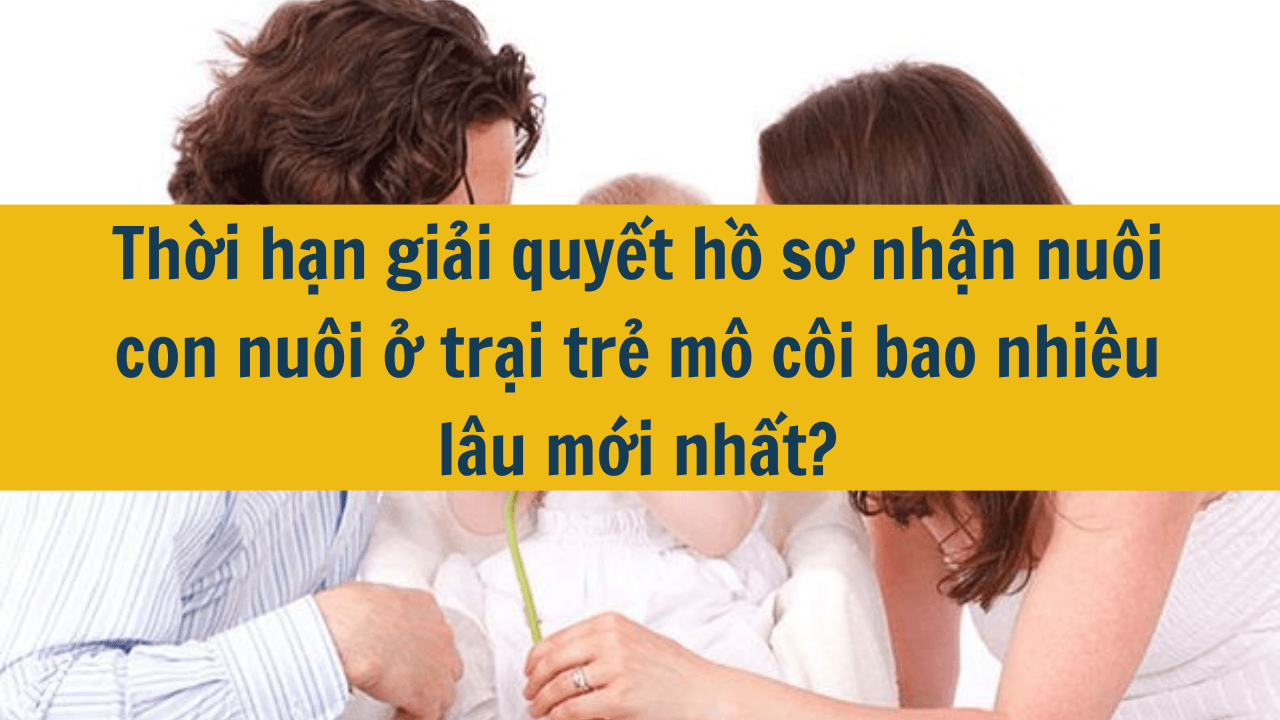
Thời hạn giải quyết hồ sơ nhận nuôi con nuôi ở trại trẻ mô côi bao nhiêu lâu mới nhất 2025?
Việc nhận nuôi con nuôi tại các trại trẻ mồ côi là một quy trình phức tạp, yêu cầu thời gian để đảm bảo rằng mọi bước đều được thực hiện đúng pháp luật và bảo vệ quyền lợi của trẻ em. Một trong những vấn đề quan trọng mà các cá nhân, gia đình quan tâm khi thực hiện thủ tục nhận nuôi là thời gian giải quyết hồ sơ. Theo các quy định pháp lý mới nhất trong năm 2025, thời gian giải quyết hồ sơ nhận nuôi con nuôi ở các trại trẻ mồ côi có thể thay đổi tùy theo từng trường hợp cụ thể. Bài viết này sẽ cung cấp thông tin chi tiết về thời gian giải quyết hồ sơ nhận nuôi con nuôi và các yếu tố ảnh hưởng đến quá trình này. 27/12/2024Điều kiện nhận nuôi con nuôi ở trại trẻ mồ côi được quy định thế nào mới nhất 2025?
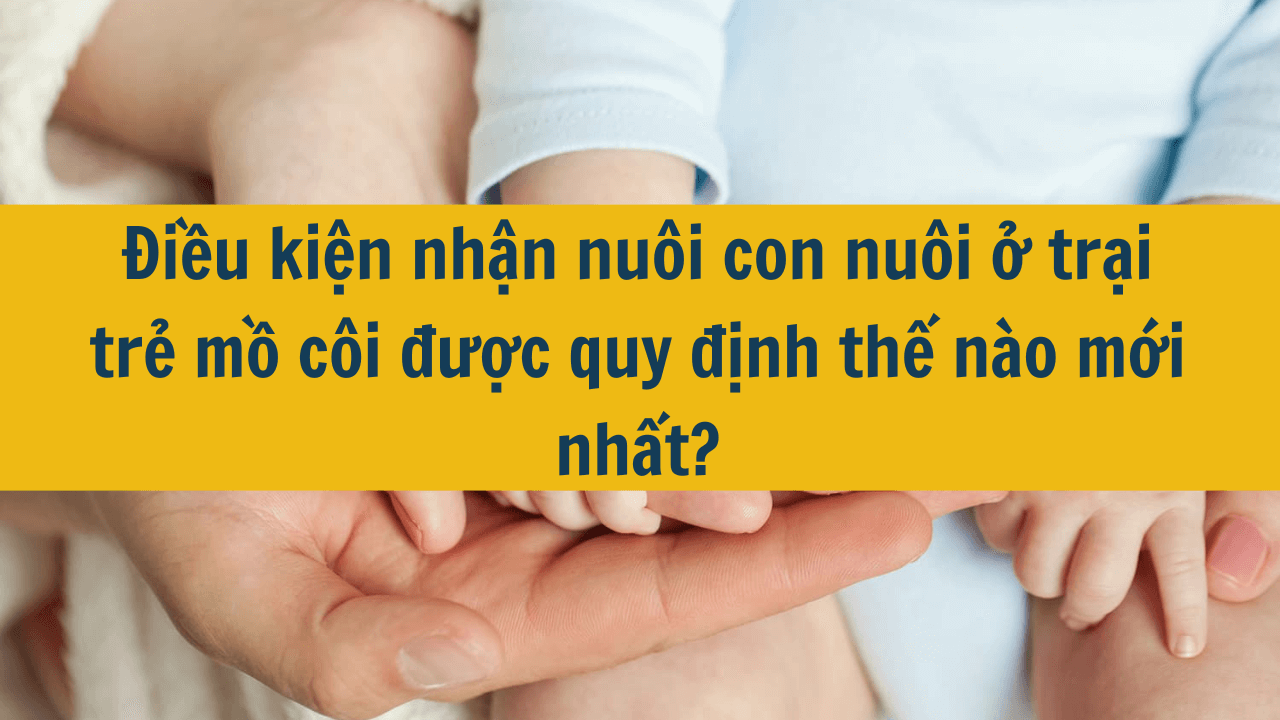
Điều kiện nhận nuôi con nuôi ở trại trẻ mồ côi được quy định thế nào mới nhất 2025?
Nhận nuôi con nuôi tại các trại trẻ mồ côi không chỉ là một hành động mang tính nhân văn, mà còn là một quy trình pháp lý nghiêm ngặt nhằm bảo vệ quyền lợi của trẻ em và gia đình nhận nuôi. Để có thể thực hiện việc nhận nuôi một trẻ em tại các cơ sở nuôi dưỡng này, các cá nhân hoặc gia đình cần đáp ứng một số điều kiện pháp lý cụ thể theo quy định của pháp luật Việt Nam. Những điều kiện này được thiết kế nhằm đảm bảo rằng việc nhận nuôi sẽ mang lại một môi trường sống ổn định và phát triển cho trẻ em. Bài viết này sẽ cung cấp thông tin chi tiết về các điều kiện nhận nuôi con nuôi ở trại trẻ mồ côi mới nhất năm 2025, giúp các bậc phụ huynh và cá nhân quan tâm hiểu rõ quy trình và các yêu cầu cần thiết. 27/12/2024Thủ tục nhận nuôi con nuôi ở trại trẻ mồ côi được thực hiện thế nào mới nhất 2025?

Thủ tục nhận nuôi con nuôi ở trại trẻ mồ côi được thực hiện thế nào mới nhất 2025?
Việc nhận nuôi con nuôi tại các trại trẻ mồ côi là một trong những phương thức giúp trẻ em có hoàn cảnh khó khăn được bảo vệ và phát triển trong một gia đình mới. Tuy nhiên, thủ tục nhận nuôi con nuôi tại các trại trẻ mồ côi không phải là một quy trình đơn giản, mà cần tuân theo các quy định pháp lý nghiêm ngặt để bảo đảm quyền lợi của trẻ em và gia đình nhận nuôi. Trong năm 2025, pháp luật Việt Nam tiếp tục điều chỉnh và hoàn thiện các quy trình này để đảm bảo tính hợp pháp, minh bạch và nhân đạo. Bài viết này sẽ giải thích chi tiết về các bước thủ tục nhận nuôi con nuôi tại trại trẻ mồ côi, cũng như những điều kiện mà các cá nhân, gia đình cần đáp ứng để có thể thực hiện việc nhận nuôi một cách hợp pháp. 27/12/2024Thủ tục nhận nuôi con nuôi trong nước mới nhất 2025

Thủ tục nhận nuôi con nuôi trong nước mới nhất 2025
Nhận con nuôi là một quyết định đầy ý nghĩa, giúp trẻ em có cơ hội được sống trong một gia đình đầy đủ yêu thương và chăm sóc. Tuy nhiên, để thực hiện thủ tục nhận nuôi con nuôi theo đúng quy định pháp luật, các bậc phụ huynh cần phải tuân thủ những quy trình và yêu cầu nghiêm ngặt. Bài viết này sẽ cung cấp thông tin chi tiết về thủ tục nhận nuôi con nuôi trong nước mới nhất 2025, từ việc chuẩn bị hồ sơ, điều kiện nhận nuôi, cho đến các bước pháp lý cần thực hiện. Những thông tin này sẽ giúp các gia đình hiểu rõ hơn về quyền lợi, nghĩa vụ và các bước cần thiết để hoàn tất thủ tục nhận nuôi con nuôi, đảm bảo quá trình diễn ra suôn sẻ và hợp pháp. 19/01/2025Trường hợp nào mẹ không được nuôi con theo quy định mới nhất 2025?

Trường hợp nào mẹ không được nuôi con theo quy định mới nhất 2025?
Quyền nuôi con sau khi ly hôn hay khi có tranh chấp về quyền nuôi dưỡng giữa cha mẹ là một vấn đề pháp lý quan trọng và đầy nhạy cảm. Theo quy định mới nhất của pháp luật năm 2025, không phải trong trường hợp nào người mẹ cũng được quyền nuôi con. Bài viết này sẽ phân tích các trường hợp mà mẹ không được nuôi con theo quy định mới nhất, từ những yếu tố ảnh hưởng đến quyền lợi của đứa trẻ cho đến những tiêu chuẩn mà pháp luật đưa ra. 19/01/2025Nộp hồ sơ nhận con nuôi trong nước ở đâu mới nhất 2025?
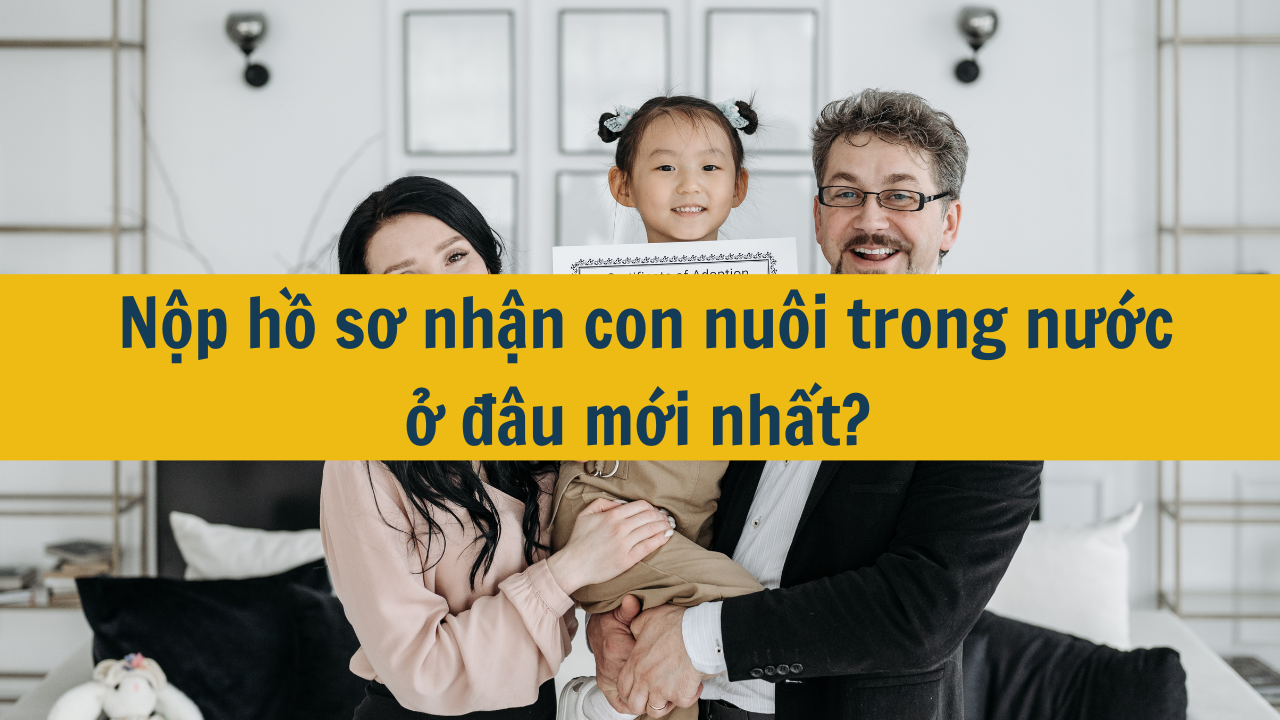
Nộp hồ sơ nhận con nuôi trong nước ở đâu mới nhất 2025?
iệc nhận con nuôi không chỉ là một quyết định quan trọng về mặt tình cảm, mà còn là một quá trình pháp lý cần tuân thủ nghiêm ngặt. Một trong những bước đầu tiên và quan trọng trong thủ tục nhận con nuôi là việc nộp hồ sơ đúng nơi quy định. Vậy nộp hồ sơ nhận con nuôi trong nước ở đâu? Đây là câu hỏi mà nhiều bậc phụ huynh có ý định nhận nuôi thường xuyên thắc mắc. 19/01/2025Nhận con nuôi từ bao nhiêu tuổi mới nhất 2025?

Nhận con nuôi từ bao nhiêu tuổi mới nhất 2025?
Nhận con nuôi là một quá trình mang tính nhân đạo cao, đồng thời yêu cầu tuân thủ nghiêm ngặt các quy định pháp luật nhằm bảo vệ quyền lợi của cả người nhận nuôi và trẻ được nhận nuôi. Theo các quy định mới nhất cập nhật năm 2025, độ tuổi tối thiểu để trẻ em được nhận làm con nuôi cũng như người nhận nuôi phải tuân theo các điều kiện cụ thể nhằm đảm bảo phù hợp với nhu cầu chăm sóc, nuôi dưỡng và phát triển. Bài viết dưới đây sẽ làm rõ độ tuổi cần thiết để nhận con nuôi, cùng các yếu tố pháp lý liên quan, giúp bạn hiểu rõ hơn về quy trình này. 27/12/2024Mẫu đơn xin nhận con nuôi trong nước mới nhất 2025
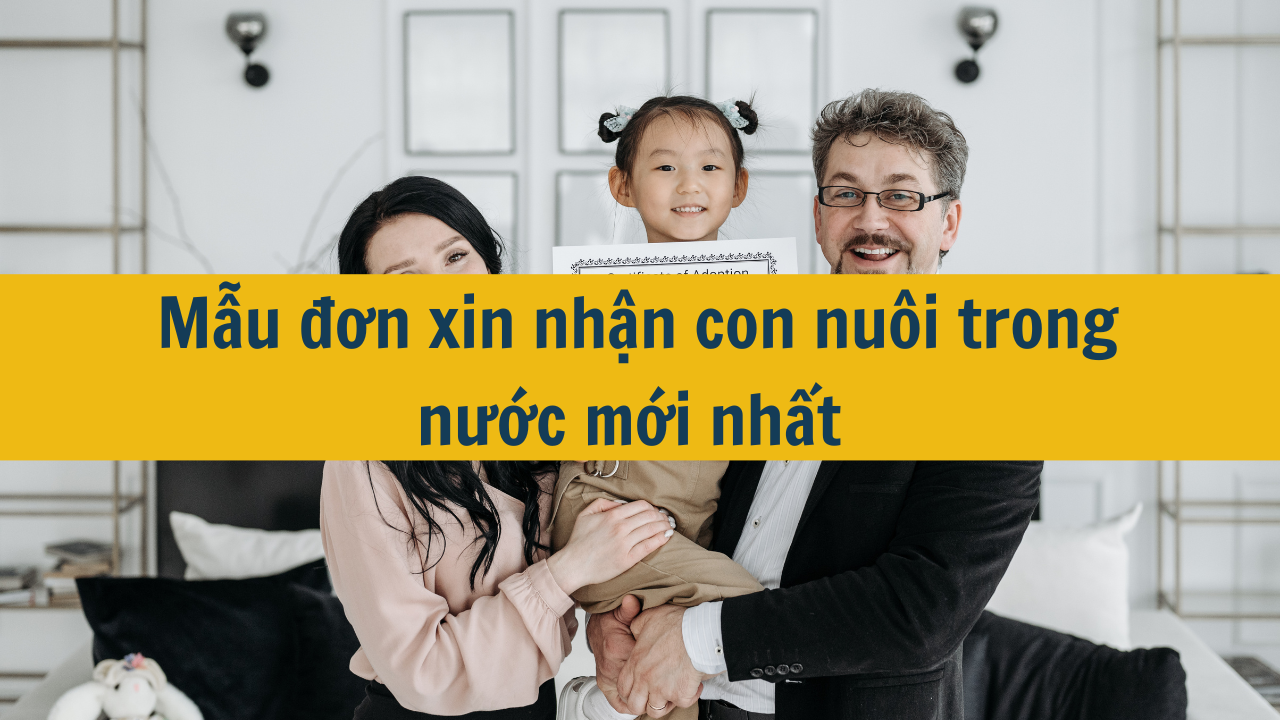
Mẫu đơn xin nhận con nuôi trong nước mới nhất 2025
Việc nhận con nuôi là một hành động đầy nhân văn, thể hiện sự quan tâm và yêu thương đối với những trẻ em thiếu thốn tình cảm gia đình. Để thực hiện thủ tục này tại Việt Nam, các cá nhân, gia đình cần tuân thủ đúng các quy định pháp lý, trong đó mẫu đơn xin nhận con nuôi đóng vai trò quan trọng. Bài viết này sẽ giới thiệu chi tiết về mẫu đơn xin nhận con nuôi trong nước mới nhất 2025, cùng các bước hướng dẫn điền đơn và các lưu ý cần thiết để quá trình nhận con nuôi diễn ra suôn sẻ. Những thông tin trong bài sẽ giúp các bậc phụ huynh hiểu rõ hơn về các thủ tục, cũng như những yêu cầu cần thiết trong việc xin nhận con nuôi theo quy định hiện hành. 19/01/2025Độc thân có được nhận con nuôi không mới nhất 2025?


 Luật nuôi con nuôi 2010 (Bản Word)
Luật nuôi con nuôi 2010 (Bản Word)
 Luật nuôi con nuôi 2010 (Bản Pdf)
Luật nuôi con nuôi 2010 (Bản Pdf)